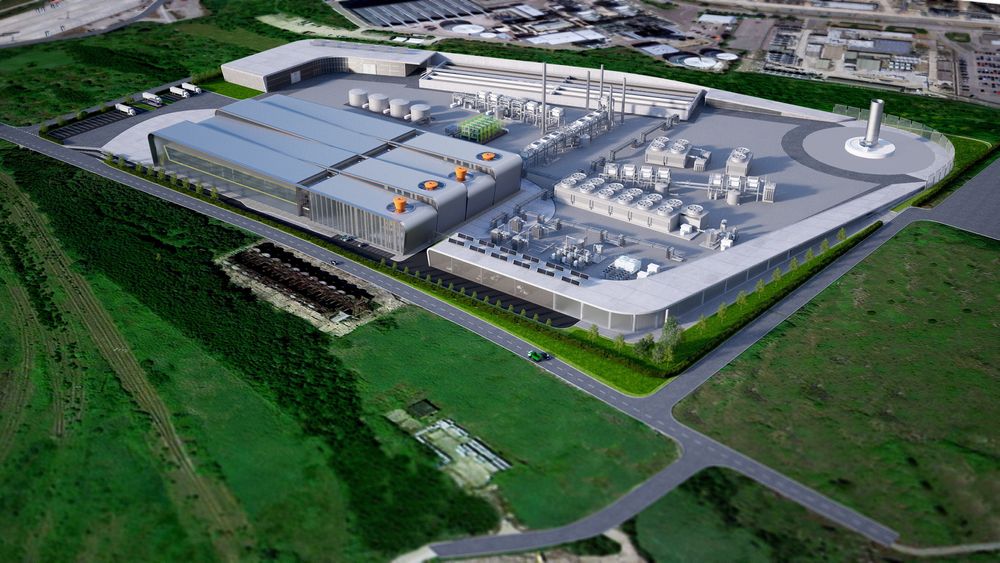British Airways has been working to ensure access to biofuel, also known as Biojet, for the aviation industry. The company is working together with the American biofuel producer Solena Fuels, and has published specific plans for the construction of a factory that will make biofuel one of their products.
Made of Garbage
British Airways has selected a site in Thurrock, Essex, which consists of a dismantled oil-refinery containing storage for fuel, pipes, a railroad and a dock by the outlet of the River Thames.
On this site, 575.000 tons of pre-treated waste, which normally would end up at a landfill, will be converted into 120.000 tons of liquid biofuel. About 50.000 tons of this will be Biojet.
British Airways commits to buy all of the commercial production of Biojet for 11 years. This now has a present value of almost 3,5 billion Norwegian Kroners (aprox. 360 million GBP). The company also invests an unknown amount into the construction of the site, which goes by the name of “Greensky London”.
Norwegian Plans
Avinor and Viken Skog are working on building a factory on the old site of Follum factories outside Hønefoss to produce the so-called Jet A-1. The CEO of Viken Skog, Ragnhild Borchgrenvink, claims that the British plans do not rule out the possibilities of an establishment of a Norwegian factory.
- The aviation industry’s need of biofuel is so extensive that to be met, it will demand the capacity of production from several locations. “The amount that we are planning to produce will only cover a fraction of the needs of Oslo Airport Gardermoen”, said Borchgrenvink to Teknisk Ukeblad.
On the other hand, Scientist Judit Sandquist of Sintef Energi states that the British plans might have a big impact on the possibilities of a Norwegian factory, depending on whether or not the investment will be successful.
High Risk
- Solena Fuels Corporation has a gasification technology based on plasma technology that is functional in very high temperatures and normally used to destroy hazardous waste. This technology will combine with Fisher-Tropsch chemical processes, which are used in larger scales of fuel production based on gas and coal.@


- “Solena will use a new Fisher-Tropsch system adapted to smaller volumes of production. But the biomass gasification and the Fisher-Tropsch conversion is not yet commercial, and Solane does not have a site to demonstrate the technology. Although they have been working for 6 years on combining the systems, it is a big risk for the participants to start directly with a full-scale factory,” said Sandquist to Teknisk Ukeblad.
Risk of setbacks
If British Airways and Solena are to succeed in demonstrating functional technology, and one that it is profitable, then the technical risk will be significantly smaller for other factories later on, and the interest of investment in this kind of technology will increase, says Sandquist.
- “It will have a positive effect on the plans of production of Jet A-1 in Norway, and have a huge impact on the bio-economy and the bio-fuel-industry in general. If they are unsuccessful, it will be a setback for the field as a whole. We have seen a lot of shutdowns,” says Sandquist.
Solena’s plasma technology is a high-temperature gasification technology that breaks down the organic waste, mainly into carbon monoxide, carbon dioxide, and hydrogen. The Fischer-Tropsch is a catalyst technology where carbon monoxide and hydrogen is converted into hydrocarbons in different lengths of chains, depending on how the process is managed. The final product, called “Fisher Tropsch wax”, is then broken down into different types of fuel, like bio-diesel, nafta and kerosene (Biojet). The process will also include the production of electricity.
- “There are a lot of power point plans for these kinds of plants, and the companies are set on building these factories. The economy for these factories is dependent on receiving waste for free, or getting paid for receiving the waste that will be their feedstock. Great Britain has a challenging waste-situation, and the price for getting rid of waste is high,” comments Sandquist.
Emission Reduction
According to the official statement for British Airways, the planned Biojet production will be enough to supply the company’s flights from London City Airport by the city’s financial district “twice”, with carbon savings equal to the emission from 150.000 cars on British roads.


- This unique project marks a significant step forward for the aviation industry. The construction of the Greensky London site will be the template for a significant reduction of British Airways’ carbon emission, says CEO of International Airlines Group (IAG – owner of British Airways) Willie Walsh in the statement
According to Robert Do, President and CEO of Solena Fuels, they are ready to start construction of the plant about twelve months after all necessary permits and agreements are in place. The partners have expressed that they want the production plant ready by the end of 2014.
-“I believe that this plant will not be ready before 2016, because there are some delays already,” said Sandquist to Teknisk Ukeblad.

